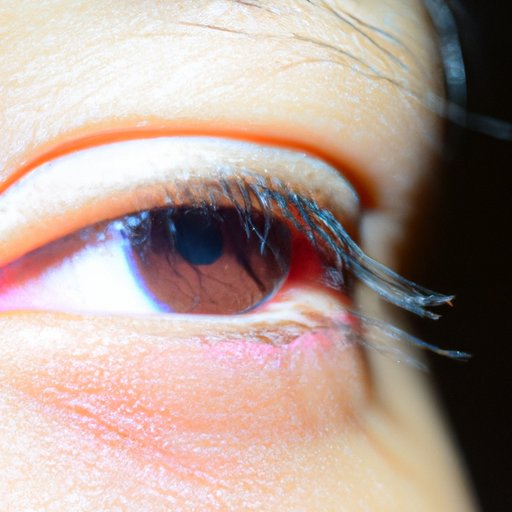
Introduction
Have you ever suffered from pink eye, also known as conjunctivitis, and wondered how long you are contagious for? Pink eye is a common eye infection that affects people of all ages, and it is essential to understand how it spreads and the duration of contagiousness. This article will provide detailed information on the causes of pink eye, its contagiousness, and the duration of different types of infections.
Understanding the Symptoms: What is Pink Eye and How Does it Spread?
Pink eye is an inflammation of the conjunctiva, the thin, transparent layer of tissue that covers the white part of the eye and the inside surface of the eyelids. It can be caused by viruses, bacteria, or allergens. The symptoms of pink eye include redness, itching, burning, discharge, and swelling. The infection can spread quickly from one person to another, particularly in settings where multiple people are in close contact.
How Contagious is Pink Eye?
Pink eye is contagious, and the duration of the contagious period varies depending on the cause of the infection. For viral pink eye, you are contagious as long as you have symptoms, which can last up to two weeks. Bacterial pink eye is contagious until 24 hours after you start taking antibiotics. Allergic pink eye is not contagious but can be mistaken as an infection because the symptoms are similar.
Pink Eye: The Different Types of Infections, Their Duration and Contagiousness
There are three types of pink eye infections, viral, bacterial, and allergic. As mentioned earlier, the contagious period varies for each type of infection. With viral pink eye, the contagious period starts a few days before symptoms appear and can last up to two weeks. Bacterial pink eye is distinct, as it may come on suddenly and has a shorter contagious period. Symptoms usually appear three to four days after exposure, and the contagious period lasts until a day or two after antibiotic treatment has begun. Allergic pink eye, as mentioned earlier, is not contagious, but the symptoms can last as long as you are exposed to the allergen.
When Should You Seek Medical Attention for Pink Eye?
You should seek medical attention for pink eye if you have moderate to severe eye pain, sensitivity to light, blurred vision, a lot of discharge, or if the symptoms worsen or don’t improve after a few days. If you have viral or bacterial pink eye and wear contact lenses, it is best to switch to glasses until the infection clears up. If you experience severe eye pain or sudden vision changes, you need immediate medical attention.
Steps to Prevent the Spread of Pink Eye
The best way to prevent the spread of pink eye is to practice good hygiene. Wash your hands frequently, avoid touching your eyes, and avoid sharing towels, bedding, and washcloths. If you have pink eye, you should closely follow a few guidelines to prevent its spread to others. Wash your hands often and thoroughly, avoid touching your face, and use a separate towel and washcloth from others. Dispose of tissues and other materials you use to clean your eyes in a sealed bag before throwing them away.
Caring for Yourself and Others: Treating and Managing Pink Eye
Home remedies can help ease the symptoms of pink eye. Use warm or cool compresses on your eyes a few times a day, and remove any crusty discharge with a clean, damp washcloth. Over-the-counter eye drops can provide relief from itching, watering, or other discomfort, but it is important to remember that medication only treats the symptoms but not the infection itself. It is essential to consult a doctor for medication to treat the infection properly.
Dispelling Misconceptions: The Truth About Contagiousness of Pink Eye
Contrary to popular belief, pink eye is not always highly contagious, and some strains of the infection are non-contagious. It is essential to seek advice from a medical professional to determine the type of pink eye infection you have, the duration of the contagious period, and the appropriate course of treatment. Keeping hygiene practices, avoiding touching your face, and avoiding close contact with infected persons should be strictly followed.
Conclusion
Pink eye is a common eye infection that can cause discomfort and problems if left untreated. Understanding the contagiousness and duration of its various types and practicing proper hygiene can help prevent its spread. It is necessary to seek medical attention promptly if you experience severe symptoms or do not see improvement after a few days of home remedies. Stay safe and seek medical attention when it is necessary.




